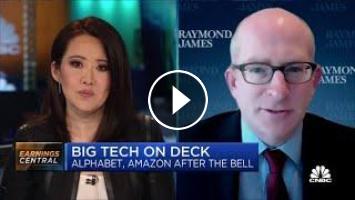Aaron Kessler, Raymond James analyst, joins 'Power Lunch' to discuss his earnings expectations for Alphabet and Amazon. Subscribe to CNBC Pro to access our live Pro Talk “How to Navigate the Reddit Market Mania” with Fundstrat’s Tom Lee and CNBC’s Mike Santoli: https://cnb.cx/3r7vPrJ
Amazon announced in its earnings report for the fourth quarter of 2020 that AWS CEO Andy Jassy will replace Jeff Bezos as CEO during the third quarter of this year. Bezos will transition to the role of executive chairman.
The company also delivered its largest quarter by revenue of all time at $125.56 billion, pushing it past the symbolic $100 billion mark for the first time.
Shares of Amazon were up 1% in extended trading.
Here are the results:
Earnings: $14.09 vs $7.23 per share forecast by Refinitiv
Revenue: $125.56 billion vs $119.7 billion forecast by Refinitiv
Bezos announced his decision to step down in the earnings release and in a memo to employees, noting that he will focus on “new products and early initiatives” in his new role, including the Day One Fund, Bezos Earth Fund, The Washington Post and his private space company Blue Origin.
“If you do it right, a few years after a surprising invention, the new thing has become normal. People yawn. That yawn is the greatest compliment an inventor can receive,” Bezos wrote. “When you look at our financial results, what you’re actually seeing are the long-run cumulative results of invention. Right now I see Amazon at its most inventive ever, making it an optimal time for this transition.”
After several months of heavy investments, Amazon said it expects coronavirus-related costs to decelerate to about $2 billion in the first quarter of fiscal 2021, down from roughly $4 billion in the third quarter of this year and more than $2 billion in the second quarter.
On a call with reporters, Amazon CFO Brian Olsavsky attributed the step down in Covid costs to a shift in volume. “We’re expecting volumes to drop about 25% from Q4 to Q1,” he added.
The company also experienced higher costs in the fourth quarter after it paid a one-time $300 bonus to front-line employees in November of last year.
The company forecast operating income of $3 billion to $6.5 billion in the fiscal first quarter, assuming the roughly $2 billion of costs related to Covid-19.
Amazon said sales in the first quarter will be between $100 billion and $106 billion, a slowdown from the fourth quarter of 2020, but an increase of between 33% and 40% from a year earlier. Analysts were expecting revenue of $95.8 billion.
Amazon’s blockbuster fourth-quarter results were driven in part by what the company called a “record-breaking holiday season,” during which it delivered more than a billion products to shoppers worldwide. Continued accelerated e-commerce demand and a pandemic-delayed Prime Day also contributed to Amazon’s record revenue in the quarter.
Once again, the costs of shipping those goods to consumers ticked higher, with expenses up 67% from a year earlier to $21.5 billion.
Outside of its core retail business, Amazon’s cloud-computing unit saw its revenue climb 28% to $12.7 billion from $9.95 billion a year earlier. That fell short of Wall Street’s expectations of $12.83 billion.
Sales fell 8% in Amazon’s physical store unit, which includes Whole Foods Market, as the pandemic has pushed shoppers to experiment with new shopping methods, including online grocery ordering.
Amazon announced in its earnings report for the fourth quarter of 2020 that AWS CEO Andy Jassy will replace Jeff Bezos as CEO during the third quarter of this year. Bezos will transition to the role of executive chairman.
The company also delivered its largest quarter by revenue of all time at $125.56 billion, pushing it past the symbolic $100 billion mark for the first time.
Shares of Amazon were up 1% in extended trading.
Here are the results:
Earnings: $14.09 vs $7.23 per share forecast by Refinitiv
Revenue: $125.56 billion vs $119.7 billion forecast by Refinitiv
Bezos announced his decision to step down in the earnings release and in a memo to employees, noting that he will focus on “new products and early initiatives” in his new role, including the Day One Fund, Bezos Earth Fund, The Washington Post and his private space company Blue Origin.
“If you do it right, a few years after a surprising invention, the new thing has become normal. People yawn. That yawn is the greatest compliment an inventor can receive,” Bezos wrote. “When you look at our financial results, what you’re actually seeing are the long-run cumulative results of invention. Right now I see Amazon at its most inventive ever, making it an optimal time for this transition.”
After several months of heavy investments, Amazon said it expects coronavirus-related costs to decelerate to about $2 billion in the first quarter of fiscal 2021, down from roughly $4 billion in the third quarter of this year and more than $2 billion in the second quarter.
On a call with reporters, Amazon CFO Brian Olsavsky attributed the step down in Covid costs to a shift in volume. “We’re expecting volumes to drop about 25% from Q4 to Q1,” he added.
The company also experienced higher costs in the fourth quarter after it paid a one-time $300 bonus to front-line employees in November of last year.
The company forecast operating income of $3 billion to $6.5 billion in the fiscal first quarter, assuming the roughly $2 billion of costs related to Covid-19.
Amazon said sales in the first quarter will be between $100 billion and $106 billion, a slowdown from the fourth quarter of 2020, but an increase of between 33% and 40% from a year earlier. Analysts were expecting revenue of $95.8 billion.
Amazon’s blockbuster fourth-quarter results were driven in part by what the company called a “record-breaking holiday season,” during which it delivered more than a billion products to shoppers worldwide. Continued accelerated e-commerce demand and a pandemic-delayed Prime Day also contributed to Amazon’s record revenue in the quarter.
Once again, the costs of shipping those goods to consumers ticked higher, with expenses up 67% from a year earlier to $21.5 billion.
Outside of its core retail business, Amazon’s cloud-computing unit saw its revenue climb 28% to $12.7 billion from $9.95 billion a year earlier. That fell short of Wall Street’s expectations of $12.83 billion.
Sales fell 8% in Amazon’s physical store unit, which includes Whole Foods Market, as the pandemic has pushed shoppers to experiment with new shopping methods, including online grocery ordering.
- Catégories
- E commerce Amazon















Commentaires